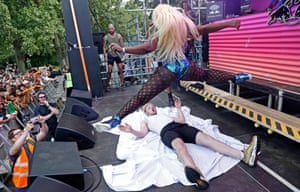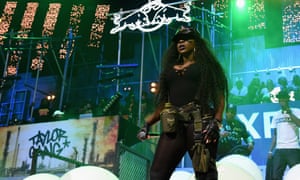La reina del dancehall
Spice: ‘When you hear mi songs, try not to whine!’
She is the dancehall queen who has made an impact – not least when jumping on her fans. Now she is bringing her X-rated show to Notting Hill carnival
Por Clare Considine
As Jamaica’s leading female voice in dancehall, Spice certainly knows how to make an entrance. When she stepped out at the Culture Clash soundclash at London’s O2 Arena in 2016, it was into the chaos of balloons, airhorns and baying ravers. She strode to the front of the stage, demanded a rewind from the DJ and silence from the crowd, then jump-dropped into the splits, calling on the rival team leader Wiz Khalifa, the posterboy for fragile masculinity(who is scared to eat a whole banana in public, for fear of looking gay) to “eat mi pum pum”. The crowd went insane. Her crew Mixpak (featuring Popcaan and Jubilee) were the bookie’s underdogs, but walked away with that year’s trophy.
Spice – Grace Hamilton when she’s off duty – grew up in Portmore, near Kingston, and wasn’t always destined for dancehall greatness. She was the middle child of five siblings and came from what she calls “humble beginnings”. Her childhood years were dedicated to Sunday school and choir. It wasn’t until she started high school that she discovered the dancehall sound and realised that she could use her well-trained pipes for less godly lyrical content.
At just 15, Spice was introduced to Junior “Heavy D” Fraser, the organiser of Sting – an annual Boxing Day coming-together of dancehall’s major players. He was impressed by her talent and invited her to perform. “A Sting audience will boo you and throw bottles at you,” Spice laughs as we chat on the phone while she is driven through her homeland’s hills. “When you can conquer that crowd in Jamaica, you can conquer anywhere in the world.” Her performing debut saw her called back to the stage for numerous encores. Backstage, Bounty Killer told her: “You’re going to be next queen of the dancehall.”
That was at the turn of the millennium. Spice now boasts a run of accolades including female DJ of the year at Jamaica’s International Reggae and World Music awards for 10 years running; first to top 1 million followers on Instagram; 87m YouTube views for her 2014 hit So Mi Like It; and, with Romping Shop, the first Jamaican collaboration to hit the US billboard charts with her long-time creative ally Vybz Kartel. Clearly, Bounty Killer called it right.
And yet, she has nowhere near the global recognition of her male peers including Vybz or Popcaan. Dancehall has echoed hip-hop’s tiresome rhetoric that there’s only room for one woman at the top. “I explain all the time that there’s room for all of us,” says Spice. “I can be performing in Canada tonight and another woman can be performing in England on the same night, but I don’t think they’re getting it.” Right back to the days of Sister Nancy, women have struggled to become household names in a scene where the ultimate benchmark is often “up there with the men”.
But Spice is determined to do whatever it takes to get that recognition. She arrived at the launch of her single Conjugal Visit with a Vybz Kartel lookalike as a prank, briefly making people believe that her co-star on the track – sentenced to life in jail in 2014 for murder – had broken out for the party. Her Instagram is a daily updated riot of hyper-colour maximalism; she is worth following for her Chanel-branded birthday pancakes alone. At the 2017 Notting Hill carnival she called a young white man to the stage, demanded he lie on the floor and then hurled herself from a 10ft speaker stack, legs split, daggering right into his crotch.

Her most recent and high-profile visual stunt offered further insight into why superstardom may have thus far evaded her. Last October, Spice showcased her new dramatically “bleached” skin to her 2.2m Instagram followers, to an onslaught of criticism from media and fans. Then she released her single, Black Hypocrisy. In the video she switches from her natural, radiant black skin to heavy white makeup, while singing lyrics such as: “Dem seh mi black til mi shine / Til mi look dirty”.
“A lot of people would say: ‘Spice is so bad and so lyrical, but could she reach further if she was lighter,’ or ‘Spice is so rich, why is she still so dark-skinned?’” she explains. “That line was just one online comment from a black girl in Jamaica. It was my people making negative comments about my complexion. And it really started to affect me.” When the song came out, the girl who made the comment contacted her to apologise
“Society makes you feel like you have to change to please them,” Spice continues. “I was provoking them and asking them: is this really what I have to do for you to accept me?” Her frustration is palpable. Proudly ambitious, she wants nothing to distract from her goal to see authentic dancehall recognised and respected globally.
Last year, in an attempt to cross over in the US, she joined the cast of the merciless reality TV franchise Love & Hip Hop: Atlanta. The show was once namechecked by Barack Obama to illustrate just how dirty the 2016 election campaign had become. However, even by those standards, Spice had a tough ride. She has been mocked for her accent, her music and her videos. One cast mate told her: “You flew here, I grew here.” Another demonstrated a wilful lack of understanding of the DIY nature of dancehall: “Every last video I’ve seen from you is horrible, honey.” This is happening within hip-hop, a scene that has been obsessed with Jamaican culture of late: patois dabbling and verses by reggae guests littering recent tracks by the likes of Drake and DJ Khaled. But just as Spice has felt pressure to subdue her blackness, the subtext is that she might go further if she also toned down her Jamaican-ness.

Spice plays by her own rules. She had a long-running feud with her label, VP Records, which signed her a decade ago, but still hasn’t let her release her debut album. So she self-released her mixtape, Captured, last November. Essentially her debut, it reached No 1 on the Billboard reggae album chart. But it’s still rare to hear her on primetime radio outside of Jamaica. And so, her ability to work a crowd has come to characterise her career. I speak to Mixpak’s DJ Jubilee about what makes Spice special. “She’s an unforgettable performer,” she says. “When she played in Brooklyn, the first 10 rows in the crowd were women screaming like it was a Justin Bieber concert.”
Perhaps sexually explicit lyrical content from the mouth of a dark-skinned woman has made radio programmers nervous. But asking a dancehall artist not to sing about sex is a bit like asking a balladeer not to sing about love. As Spice explains, slackness – the shame-free celebration of all things X-rated – is intrinsic to the genre. And to say that Spice is sex-positive would be an understatement. “As everybody knows, sex sells,” Spice laughs. “The most famous line in So Mi Like It is: ‘Skin out mi pum pum.’ So I know for a fact that’s what mi audience like.”
If we go by the logic that sex is dancing horizontally, then it follows that Spice’s tracks are dancefloor perfection. “When you hear mi songs, try not to whine!” she screams. Live, Spice and her female dancers tear up the stage with don’t-try-this-at-home back bends, twerks and gyrations. Gabriel, from UK dancehall soundsystem the Heatwave, says: “In an era where a lot of dancehall is aimed at radio and streaming audiences, Spice has focused on making songs for people to dance to. When I ask the dancers I work with what they want me to play at a show, often they’ll simply say: ‘Any Spice tune.’”
Spice bubbles with excitement when we discuss her forthcoming performance at Notting Hill carnival. England holds a special place in her heart thanks to a brief childhood stint living in Finsbury Park in London. Plus, there is a sense that she craves those moments when she can be celebrated for an undiluted version of her blackness: “When I see other people coming out and loving and embracing the Caribbean culture, it’s a good feeling for me.” And she’ll surely have something up her sleeve for the show; at her recent birthday party – fittingly, the queen of dancehall was born on Jamaican independence day – winners of a competition to dance to her single Cool It Down lumbered off stage with air-conditioning units as prizes.
Does Spice believe that she would be bigger now if she had actually lightened her skin? “It’s hard and it’s sad, but yes, I do believe that it would have made it easier,” she says, briefly despondent and then defiant. “But one way or another, people are going to respect Jamaican music, they’re going to respect my culture. And I’m going to do it without changing. I will take the difficult road.”
